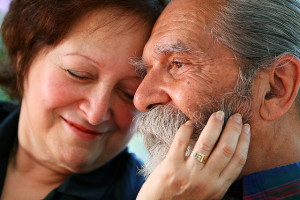- Calls to this hotline are currently being directed to Within Health, Fay or Eating Disorder Solutions
- Representatives are standing by 24/7 to help answer your questions
- All calls are confidential and HIPAA compliant
- There is no obligation or cost to call
- Eating Disorder Hope does not receive any commissions or fees dependent upon which provider you select
- Additional treatment providers are located on our directory or samhsa.gov
Caring for a Spouse With an Eating Disorder
Contributor: Leigh Bell, BA, writer for Eating Disorder Hope
 If you’ve married someone with bulimia, then you’ve also married bulimia.
If you’ve married someone with bulimia, then you’ve also married bulimia.
You’re married to the eating disorder because your spouse is.
Sharing the Burden
Eating disorders are a persuasive force, a snake-oil salesman who markets emotional escape but is really selling suffering. But before someone realizes this, they’re hooked. They have an eating disorder.
If you’ve been married for a while and have just learned of your spouse’s eating disorder, you may feel betrayed, and this is understandable. Still, realize eating disorders are cloaked in shame because, in the end, it’s a weakness. An achilles heel. A kryptonite.
It’s frightening to admit this, and people think maybe, just maybe, they can deal with it before it becomes an issue for the person they love most, our spouse. Maybe you’ve known about the bulimia for a while. It’s taking over your spouse, and you want to help him or her.
How to Help
First, the bulimia isn’t your fault. Eating disorders a dangerous concoction of genetics, environment, personal history, and other factors we may never know. But husbands and wives don’t cause bulimia.
 Second, learn what you can about bulimia and what your spouse is experiencing. This will help you understand why they’re acting and reacting the way they are. Society accepts as true many myths and untruths about the illness, and you want to know the difference.
Second, learn what you can about bulimia and what your spouse is experiencing. This will help you understand why they’re acting and reacting the way they are. Society accepts as true many myths and untruths about the illness, and you want to know the difference.
While caring for you spouse with bulimia, it is important to remember:
- Bulimia is not a choice, but recovery is.
- Someone cannot simply “stop” being bulimic.
- Weight does not indicate the severity of an eating disorder – (this is especially true for bulimia)
- Bulimia is dangerous – almost 4% of those with the eating disorder die because of it.
- Recovery is a gradual process that will be full of ups and downs, but people can and do fully recover from bulimia.
 The spouse of someone with bulimia uniquely experiences an important aspect of the eating disorder: Sex. People struggling with an eating disorder likely have poor body image, which gets in the way of intimate affection and a healthy sex life. Your spouse may not want to have sex because he or she feels badly about their body. They may be embarrassed to share their body with you. Understanding this common characteristic of an eating disorder may prevent you from feeling rejected or like your spouse isn’t attracted to you.
The spouse of someone with bulimia uniquely experiences an important aspect of the eating disorder: Sex. People struggling with an eating disorder likely have poor body image, which gets in the way of intimate affection and a healthy sex life. Your spouse may not want to have sex because he or she feels badly about their body. They may be embarrassed to share their body with you. Understanding this common characteristic of an eating disorder may prevent you from feeling rejected or like your spouse isn’t attracted to you.
When it comes to weight and food, it’s best not to talk about it. Just don’t. Not even about your own weight and/or food intake. Now, helping your spouse may become part of the treatment plan, and of course, follow the treatment plan. Encourage your spouse to do the same.
Getting Treatment
 If your spouse isn’t in treatment, encourage them to start. You can help by searching treatment options and verifying what your insurance policy will and won’t cover.
If your spouse isn’t in treatment, encourage them to start. You can help by searching treatment options and verifying what your insurance policy will and won’t cover.
Treatment may logistically be an issue if your spouse has a full-time job and/or children to care for. This are not insurmountable issues. Under most conditions, employers are required by the Family Medical Leave Act to allow employees to seek treatment without losing their jobs. If childcare is the issue, do whatever you can to open the treatment door to your spouse.
There are many options aside from inpatient treatment if individuals are healthy enough to stay at home. These include partial hospitalization (nonresidential treatment for about 8 hours each weekday); intensive outpatient (nonresidential treatment a few full days a week or partial days all week); and an outside treatment team (arranging regular visits with a private therapist, dietician and any other needed professionals).
Encourage your spouse to follow treatment recommendations, offer to attend family/marriage counseling sessions, and be as involved in her therapy as possible. He or she will need your support.
If your spouse refuses treatment, emphasize the reality of recovery with the right treatment. In the hands of bulimia, people tend to lose hope and may need lots of encouragement. Give your spouse some time to absorb the reality of his or illness, and then revisit treatment.
If your spouse continues to refuse treatment, you have a few legal options to use as a last resort. Medical guardianship and financial conservatorship are ways to gain more power over decisions best for him or her. Another legal option is what’s called a “72-Hour Hold,” which means a hospital can hold and/or treat people deemed in immediate danger to themselves or others.
Commit
 Hopefully, none of these actions is needed and your spouse willingly enters treatment and moves toward recovery. Remember this is a marathon. Pace yourself. Take care of yourself. Seek support from friends and family, and you may consider seeing your own therapist, with whom you can vent frustrations – because you will have them – in a healthy way.
Hopefully, none of these actions is needed and your spouse willingly enters treatment and moves toward recovery. Remember this is a marathon. Pace yourself. Take care of yourself. Seek support from friends and family, and you may consider seeing your own therapist, with whom you can vent frustrations – because you will have them – in a healthy way.
For better or worse is what we say in marriage. Your commitment to your spouse during some of the worse will help him or her get better.
Ask how you can help and how they’re feeling; and listen with patience and an open mind.
The National Eating Disorder Association (NEDA) offers more advice for supporting a loved one with an eating disorder:
- Refrain from telling the person what they should do.
- Offer to help with practical tasks (laundry, errands, etc.)
- Focus on the emotional aspects of the eating disorder, not just the physical ones.
- Arrange activities that don’t involve food or eating so your spouse can take part and enjoy it.
- Distract your spouse during and after meals to help with his or her anxiety.
- Express any concerns that arise.
- Validate their feelings and emotional pain, especially when they share something difficult.
- Don’t take their actions personally.
- Set boundaries to preserve your own emotional well-being.
Community Discussion – Share your thoughts here!
Have you or your spouse struggled with bulimia? What tools have your found to effectively be a support or how have you been effectively supported in recovery?
About the Author:
Leigh Bell holds a Bachelor of Arts in English with minors in Creative Writing and French from Loyola Marymount University in Los Angeles. She is a published author, journalist with 15 years of experience, and a recipient of the Rosalynn Carter Fellowship for Mental Health Journalism. Leigh is recovered from a near-fatal, decade-long battle with anorexia and the mother of three young, rambunctious children.
The opinions and views of our guest contributors are shared to provide a broad perspective of eating disorders. These are not necessarily the views of Eating Disorder Hope, but an effort to offer a discussion of various issues by different concerned individuals. We at Eating Disorder Hope understand that eating disorders result from a combination of environmental and genetic factors. If you or a loved one are suffering from an eating disorder, please know that there is hope for you, and seek immediate professional help.
Last Updated & Reviewed By: Jacquelyn Ekern, MS, LPC on October 9, 2015. Published on EatingDisorderHope.com

